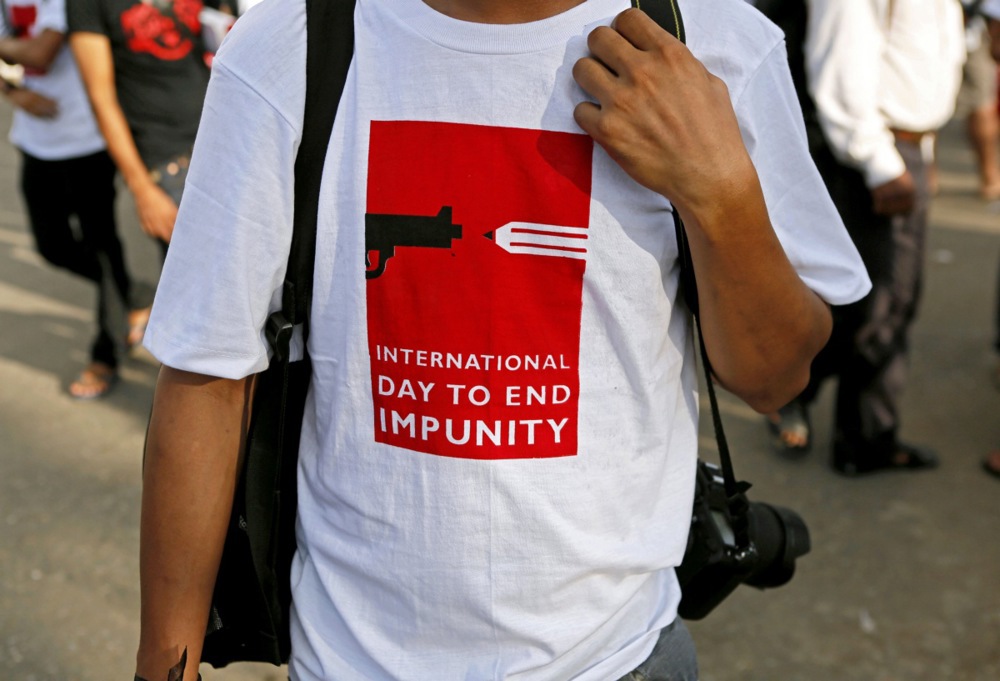Journalists in many parts of the world today face unprecedented levels of violence, attacks, and harassment, amid an increasingly hostile and dangerous climate for the media. Most crimes against the press go unpunished, fueling further violence against the media and enabling other abuses at a moment when autocrats are gaining strength around the world.
This week, IPI is joining world leaders and other civil society organizations at the African Union in Addis Ababa, Ethiopia to mark the 10th anniversary of the International Day to End Impunity for Crimes Against Journalists. As we do, we issue an urgent appeal to the international community to strengthen global commitments and mechanisms for protecting journalists’ safety and for ensuring full accountability for crimes against the press.
IDEI was launched in 2014 to encourage states to tackle rampant impunity for crimes against journalists amid escalating threats to press freedom globally. But a decade later, no progress has been made in reversing these trends: impunity for crimes against the press remains staggeringly and unacceptably high – in nine out of ten cases, the perpetrators of these crimes are never held to account – and violence, attacks and harassment of journalists continues unabated. Meanwhile, the range of threats and attacks against the media has grown in scale, sophistication, and complexity, from legal harassment to online threats to surveillance.
These trends show how dangerous and difficult the work of being a journalist has become. In too many parts of the world, journalists are being intentionally targeted – in many cases with the involvement of state actors themselves – with no accountability for those responsible. States are not only failing to uphold international law and respect the rule of law in their own countries by seeking justice for crimes against the press, but they are also failing to hold other states accountable to their commitments to do the same.
Nowhere is this more evident than in Gaza, where at least 130 journalists and media workers have been killed by the Israeli military – nearly all of which were Palestinian journalists or media workers killed by Israeli strikes – since the Israel-Hamas war began, making this the deadliest conflict for journalists on record. Numerous investigations have found clear evidence of journalists having been intentionally targeted by the Israeli military in at least some cases,which constitutes a war crime. To date, however, Israel has not opened a single investigation into any of these killings as international law and international humanitarian law would require. Moreover, Israel has consistently flouted calls by intergovernmental bodies, such as the UN, and by civil society, including press freedom and human rights groups, to respect these obligations.
The killing of journalists in Gaza is of an unprecedented magnitude. But journalists in other zones of conflict and unrest around the world are also facing deadly attacks and impunity. In Sudan, at least 11 other journalists have been killed since the outbreak of the civil war in April 2023. Earlier this year, IPI filed a request with the International Criminal Court calling on it to investigate six dozen serious attacks on Ukrainian journalists and media as potential war crimes amid Russia’s full-scale war on the country. The perilous security situation in Haiti has led to chronic impunity for attacks against the press, as IPI has reported, with journalists not only caught in the crossfire of violent clashes between gangs and remaining police forces but also deliberately targeted by both groups.
Ten years since the first International Day to End Impunity for Crimes against Journalists was launched, states have done far too little to stem the tide of attacks and threats to journalists and press freedom worldwide. This must urgently change. States and the international community must redouble their efforts to bolster protections for journalists and ensure that freedom of the press and human rights are protected and respected both at home and around the world.
